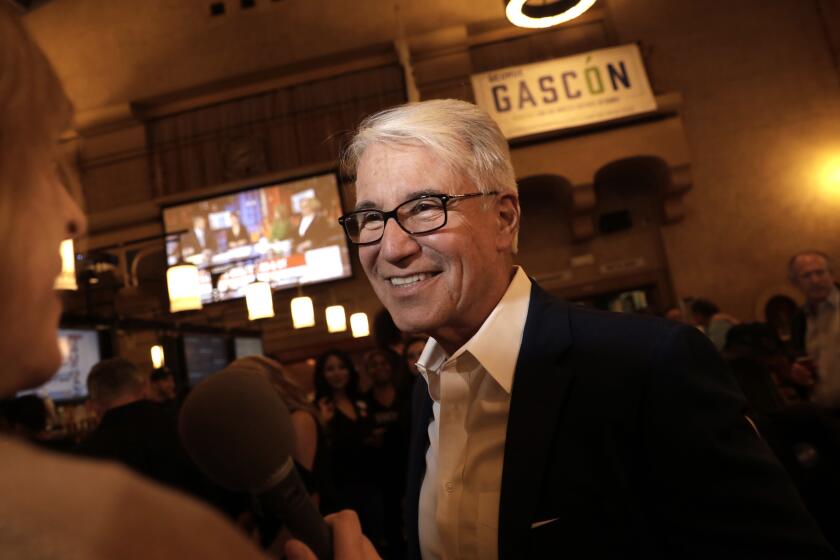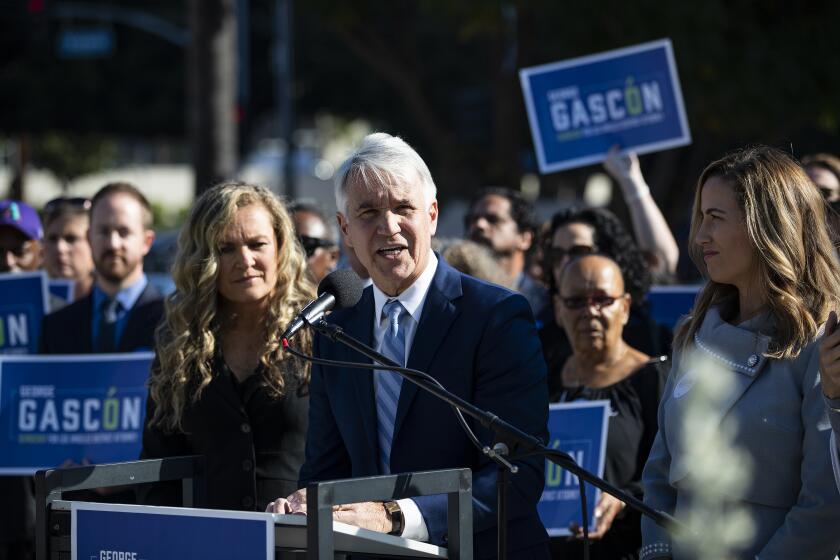Inside George Gascon’s justice revolution, a debate over what it is to be a crime victim
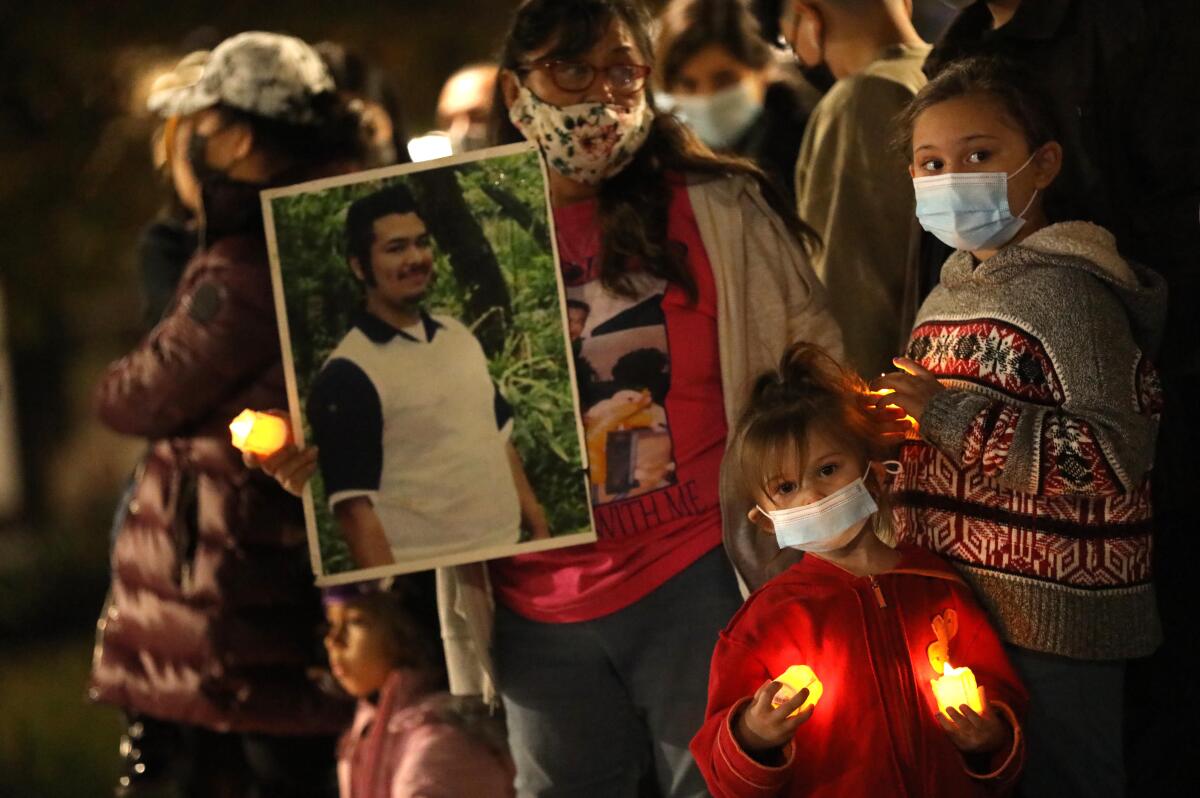
- Share via
The crime was as gruesome as any committed by an adult.
Firefighters discovered the bodies of 16-year-old Sierra Brown and her older sister, Uniek Atkins, in a burned-out Westchester apartment. Brown had been beaten and shot once at close range, while Atkins died from multiple gunshots, according to court filings. Police arrested Brown’s 17-year-old boyfriend, alleging he had doused the apartment in bleach and torched it to cover his tracks.
George Gascón inherited the 2018 killings when he took over as Los Angeles County’s district attorney in December. Before his election, prosecutors planned to try the teen as an adult and, if he was convicted, have him sent to prison for decades. It was a punishment the victims’ relatives supported.
But Gascón did not. He was elected on a promise that he would rebalance the scales of justice in Los Angeles, the most populous county in the U.S. To do it, he will have to convince many of his own prosecutors, a growing number of elected officials and other doubters to rethink what it is to be a crime victim.
In Gascón’s expansive view, victims are not just those targeted by criminals. They are also Black and Latino defendants swept up by a criminal justice system that historically has mistreated communities of color. They are teenagers who have been dealt with as adults in court — even those accused of horrific crimes like the killing of Sierra Brown and her sister. And they are people wrongly killed or injured by police.
Gascón is trying to dismantle the approach his predecessors took to crime, in which they sought to punish defendants heavily on behalf of victims. In its place, he wants something more complicated — a criminal justice system that balances prison time with rehabilitation, consequences with mercy.
“I believe that as a D.A., we are the people’s lawyer,” he said. “We certainly represent the community and not a single victim. So, when we are prosecuting cases, or we are applying our discretion, we should do so through the lens of what is best for our entire community.”
George Gascón has promised to make sweeping changes to the Los Angeles County district attorney’s office, but he will have to walk a tightrope between prosecutors who opposed his candidacy and activists promising to hold him accountable.
For juveniles, Gascón’s arrival means no more trials in adult court. For convicted murderers, that means an end to life sentences without any hope of parole. For low-level offenders, that could mean no prosecution at all. The one group Gascón has vowed to take a harder line on are police officers involved in fatal shootings, who he believes have been given too much deference.
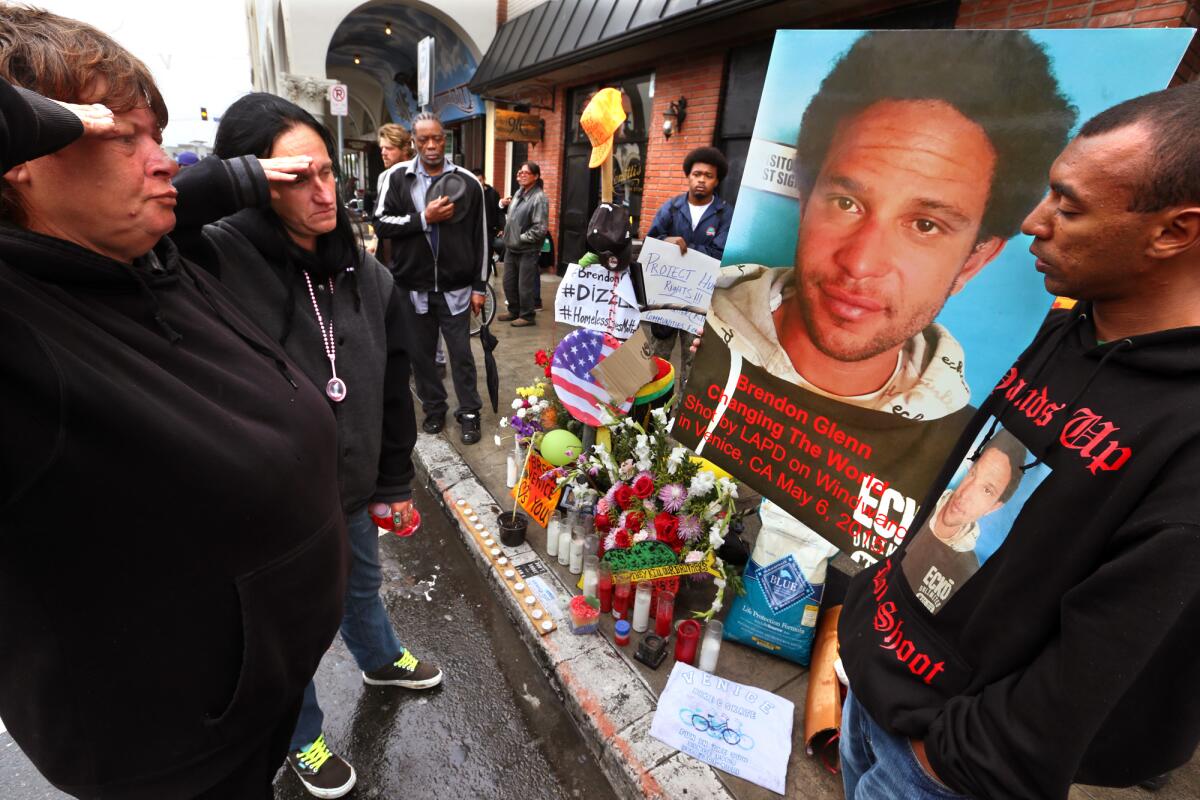
It is an audacious plan that has sent a shock through the county’s legal establishment. Not surprisingly, Gascón’s first months in office have been met with a volatile mix of enthusiastic support from progressive advocacy groups and angry opposition from a growing and varied list of critics, including L.A. County Sheriff Alex Villanueva and Fox News’ Tucker Carlson. In recent weeks, at least eight city councils in L.A. county have issued votes of “no confidence” in Gascón, and an effort to recall him has launched with Villanueva’s support.
While others in L.A. and elsewhere have sought to develop alternatives to prison for lower-level, nonviolent offenders, Gascón’s focus on serious, violent crimes has drawn a torrent of outrage from people who have lost loved ones to violence.
In the case of the Westchester arson and double murder, Gascón‘s policies had a dramatic effect. Under his predecessor, the teen — who was one month shy of 18 at the time of the killings — almost certainly would have been tried as an adult. If found guilty in juvenile court, the now 20-year-old will be free by the time he turns 25.
The case tested Gascón’s resolve. He said the horrific violence of the crime left him questioning his conviction that no kid should be tried as an adult.
“I talked to the family,” he said, “and I have to tell you that’s a case where I lost sleep over, multiple times, because what the family has gone through and will continue to go through, is tremendous.”
But, in the end, he refused to bend.
“This isn’t justice. That’s what this boils down to,” Uniek’s father, Daniel Souvinette, said in court earlier this year. “A man was voted in, his policies came in and changed all the rules for all of the victims. When you lose your only child … a parent wouldn’t see this as justice.”
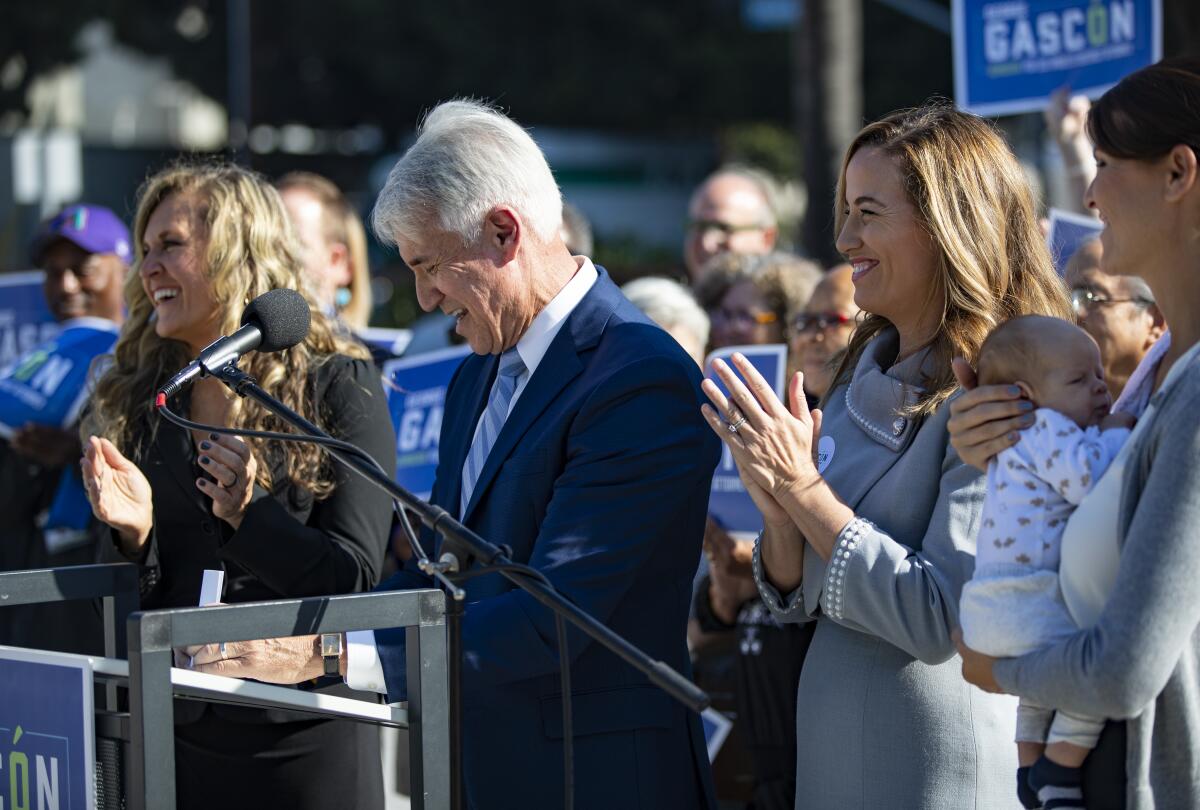
There were 89 juvenile defendants awaiting trial on murder charges in L.A. County when Gascón was elected, records show.
Gascón says he’s relying on science over emotion. Pointing to studies that show the human brain is not fully developed until age 25, Gascón says he believes the only result of trying a juvenile murder defendant as an adult will be the ruination of at least one more life.
“The question for juveniles is can we get them to a place where they have the therapeutic treatment to become someone else and not the person they were when they committed this horrendous crime,” he said. “When you go into adult prison as a juvenile … you’re either going to become prey, or you’re going to become a predator. There’s no in between.”
Criminal justice is inherently messy and imperfect. No reform can appease every interest. Five months into Gascón’s tenure, it is easier to find praise or criticism of individual cases than any objective measure of community gain or loss. But for every grieving parent or spouse, there are those who say Gascón’s policies have opened the door to a more rational and humane criminal justice system.
In October, a month before Gascón’s election, Demetrio Lazcano, 28, was facing prison time for a violent argument with his stepfather, William Gomez. High on methamphetamine, Lazcano threw several punches, opening a cut over the older man’s eye. Gomez was grateful when police came to intervene, but he begged prosecutors not to charge Lazcano. Gomez believed his stepson needed rehab, not prison.
“He didn’t know what he was doing that day. When we reunited, he apologized and said he wasn’t himself,” said Gomez, 55. “That’s why I kept saying rehab. … If you leave him in jail, that’s not going to do any good.”
Dist. Atty. George Gascón announces sweeping policy changes for cash bail in L.A. County and bans seeking sentencing enhancements in nearly all cases.
A probation report did not recommend jail time for Lazcano. Despite that, along with his lack of a criminal record and the wishes of the victim, prosecutors wouldn’t back down. They told Lazcano if he wanted to receive drug treatment from the county he would need to plead guilty to assault, spend a year in jail and remain on probation for half a decade, according to court records.
The posture of the prosecutor assigned to the case changed after Gascón was elected, according to Nikhil Ramnaney, Lazcano’s public defender. Lazcano was sentenced to probation and entered a rehab facility in December.
“It was 100%, a 180-degree turn. It was seeing the D.A. as a partner in identifying the right programming, with concern for the safety of everyone involved,” Ramnaney said at the time.
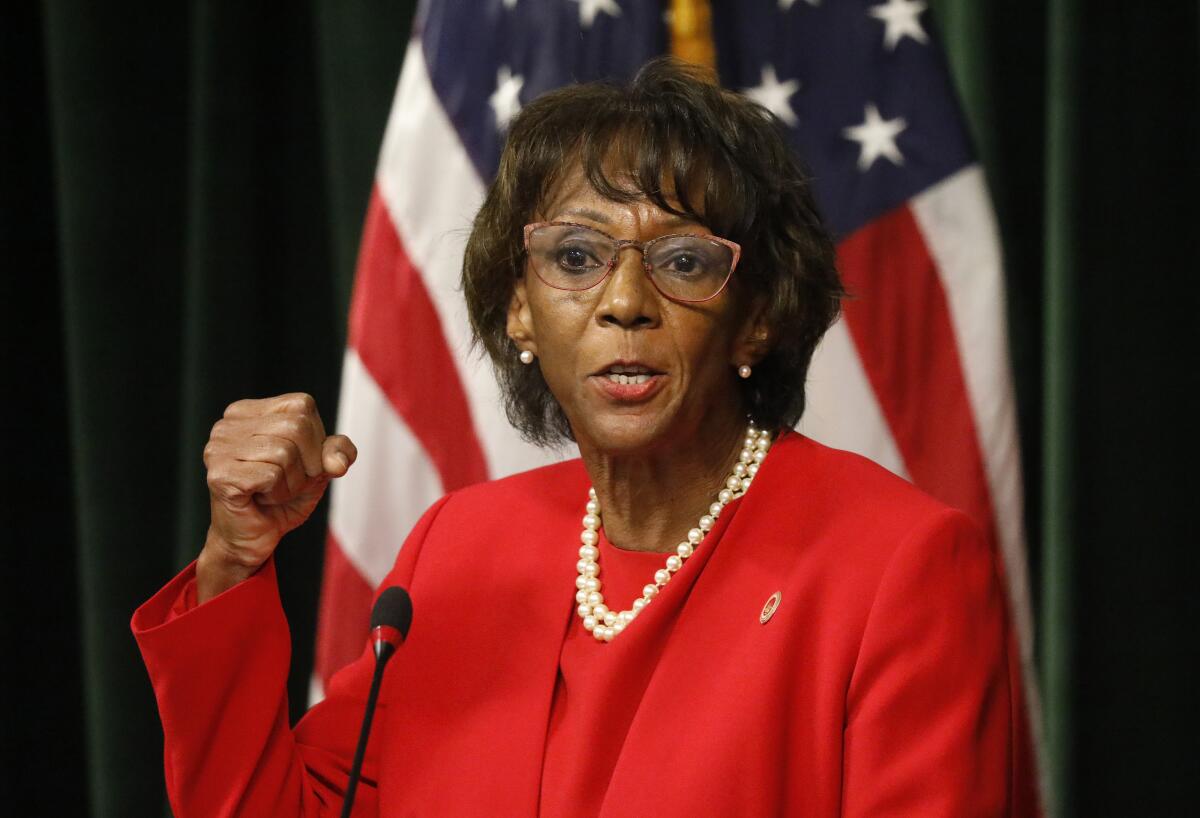
Gascón’s predecessor, Jackie Lacey, created a number of alternative sentencing courts designed to get defendants suffering from mental illness, homelessness or drug addiction out of jail and into treatment, but her office used them sparingly. Only 3,935 defendants passed through those courts from 2014 to 2020, a tiny fraction of the caseload for an office that, on average, filed more than 100,000 misdemeanor cases per year.
Gascón plans to expand such programs and has already ordered prosecutors to divert defendants accused of a number of low-level offenses, including trespassing, drinking in public, minor vehicle infractions and resisting arrest in cases where the suspect was not violent. He long championed diversion programs for nonviolent offenders in San Francisco, though critics and some criminal justice experts said those policies led to soaring increases in property crime.
“If you can achieve the public safety objective within a decade or two, there’s no need for three, four . . . decades of incarceration.”
— George Gascon, Los Angeles County District Attorney
A starker illustration of the difference between Gascón’s directives and various reforms of the past is his willingness to offer leniency to people who have committed violent crimes, even at a time when Los Angeles is experiencing a rise in gun violence.
Under Gascón’s new directives, prosecutors can no longer seek the death penalty and have been severely limited in the way they can use sentencing enhancements, which add several years to prison terms for aggravating factors such as gang membership or the use of a gun during a crime. Barring “extraordinary circumstances,” prosecutors have been directed not to seek jail time whenever a defendant is eligible to receive probation as punishment.
If Gascón gets his way, his policies won’t apply only to new cases. When he arrived, he ordered prosecutors to rescind sentencing enhancements imposed before he took office — a move that would have affected at least 11,000 active cases, records show. He was blocked when a judge hearing a lawsuit brought by the union representing his line prosecutors ruled the policy exceeded Gascón’s authority.
Gascón is appealing and has announced the creation of a unit in his office that will reconsider lengthy sentences handed down while his predecessors were in office. Although he plans to prioritize cases of elderly defendants who have served more than 15 years in prison, the policy’s “ultimate goal shall be to review and remediate every sentence that does not comport” with Gascón’s new directives. The effort could lead to changes in the outcomes of as many as 30,000 cases.
Gascón has also barred prosecutors from attending parole hearings to argue against the release of any defendant. Although records show the state parole board only granted release in about 19% of all cases it heard from 2018 to 2020, some prosecutors worry that number will increase without formal opposition from prosecutors.
In Gascón’s mind, prison sentences that exceed 40 years are impractical. Most people incarcerated for that long, he argues, pose a minimal public safety threat as they get older, yet continue to be a drain on taxpayers who have to fund their prison term.
“If you can achieve the public safety objective within a decade or two,” he said, “there’s no need for three, four ... decades of incarceration.”
Critics with traditional law-and-order views argue Gascón’s parole policy will release dangerous criminals onto Los Angeles’ streets and lead to a spike in violence. Data collected by state prison officials, however, cast doubt on that assessment. Over a recent four-year period, 2,019 people serving life sentences in California prisons were granted parole and only 63 were convicted of a new offense within three years, according to CDCR records.
The backlash to his policies has quickly left Gascón politically isolated. Inside the office, the open revolt among line prosecutors has left the D.A. with few people he can trust, while elected officials who typically would seek to align themselves with the head of one of the state’s most powerful law enforcement agencies have turned on him.
District attorneys in several other counties have announced they will no longer consolidate cases with Gascón’s office because they say his policies effectively abandon victims. Both San Diego‘s and Orange County’s district attorneys have attempted to wrest control of cases from Gascón in recent months following disputes over his policies. He’s been shunned by the California District Attorneys Assn., whose leadership includes a potential future state attorney general in Sacramento County Dist. Atty. Anne Marie Schubert. Locally, a number of former L.A. County prosecutors, including ex-Dist. Atty. Steve Cooley, banded together to provide representation to victims of violent crime who want to challenge Gascón’s handling of their cases.
George Gascón ordered a number of major changes to the Los Angeles County D.A.’s office when he took office last week, but some of his directives are meeting resistance from judges and prosecutors.
Gascón counters that his critics are focused on the short-term effect of a sentencing. He says he is trying to assuage the concerns of crime victims while also seeking sentences that could allow a defendant the chance to be rehabilitated.
“I deeply care not only about the victims that we have today, but I’ve also come to the conclusion that I have a responsibility to future victims.”
Gascón’s attempt to take on the mantle of victim advocate has enraged his adversaries.
“He does not care about people of color in this community,” Deputy Dist. Atty. Jon Hatami, one of the loudest voices in the movement to recall Gascón, told the crowd at an event in support of crime victims last month. “He is lying.”
Nearby, counterprotesters from Black Lives Matter L.A. chanted, “You’re being lied to, you’re being used,” echoing concerns that Villanueva, Hatami and other Gascón critics are exploiting victims’ voices for political gain.
Melba Pearson, a former prosecutor who ran an unsuccessful progressive campaign to take over the Miami-Dade state attorney’s office in Florida last year, said the political blowback Gascón was getting underscored a larger fight over the role of criminal prosecutors nationwide. Gascon, she said, is challenging the widely accepted idea that convictions and heavy sentences are the measure of a prosecutor’s success.
“I fully believe it is the job of the prosecutor to bring justice for the victim … but the rest of the sentence is what’s right for the offender,” said Pearson, who now serves as a deputy director for the ACLU of Florida. “And often prison is not the thing that is going to make everybody whole.”
Gascón’s approach to cases involving police officers who use deadly force has also signaled his willingness to challenge norms.
As is the case throughout the U.S., criminal charges against police officers involved in killings or other uses of force have been rare in Los Angeles. When presented with controversial police shootings, Lacey almost always refused to pursue cases, saying a jury was likely to find the officer’s actions were reasonable under state laws. Lacey’s detractors said her reluctance to charge officers in on-duty shootings came from her being too cozy with police unions, which spent millions backing her reelection campaign.
Although he never charged an officer in a shooting during his time as D.A. in San Francisco, Gascón was sharply critical of Lacey’s decisions in such cases on the campaign trail and vowed to scrutinize them more closely. After his election, he announced that relatives of people killed by officers would now be eligible for aid from the D.A.’s Bureau of Victim Services, and he has hired an independent prosecutor to review the cases of four police officers whom Lacey declined to charge.
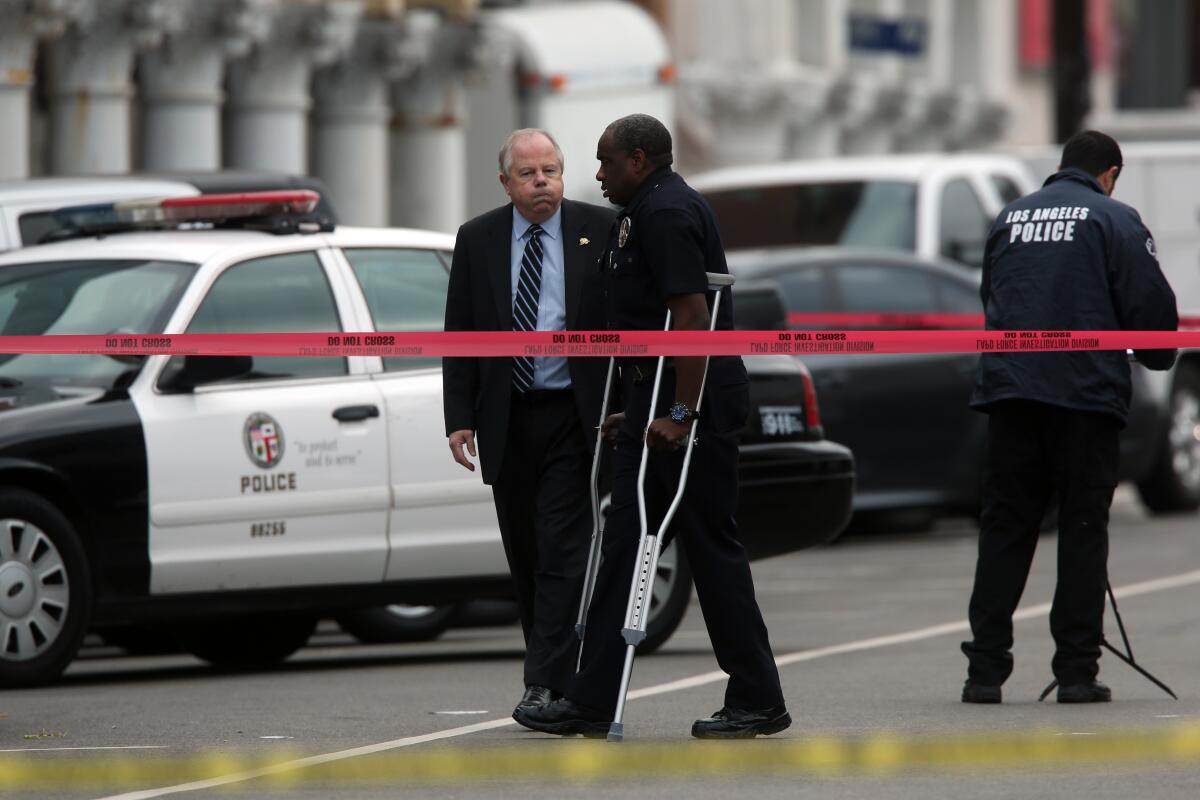
One of them is Clifford Proctor, a former LAPD officer who resigned after he shot and killed Brendon Glenn, a homeless man living on Venice Beach, in 2015. Proctor claimed Glenn had tried to grab his gun during a struggle outside a bar, but video of the incident contradicted his account, and Proctor’s patrol partner said Glenn had not posed a serious threat.
The police chief at the time, Charlie Beck, took the unusual step of calling publicly on Lacey to charge Proctor with manslaughter, but she refused.
Glenn’s mother, Sheri Campone, said Lacey’s office never contacted her about the shooting. Gascón’s approach, she hopes, will give her a second chance at the justice she feels she’s been denied.
“I felt like maybe this man will have to go to jail because he took my son’s life and he took my grandson’s father away,” she said. “Our family is completely broken.”
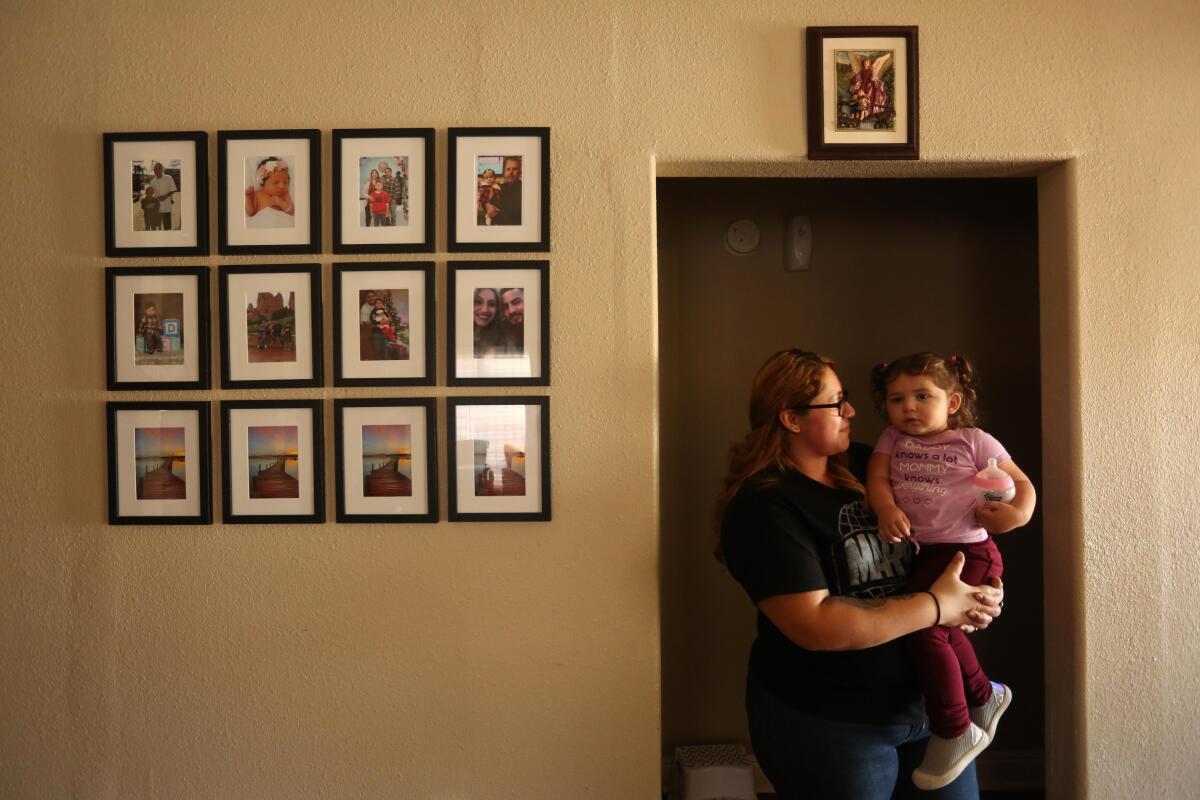
Like Campone, Jessenia Urbina’s world was shattered by gunfire, when her husband was killed in 2019 while walking home from a baby shower in Wilmington.
By law, the 15-year-old who shot Urbina’s husband was too young to be tried as an adult and was convicted of the killing as a juvenile. A 17-year-old accomplice, described by police as the getaway driver, was charged with murder and was expected to be tried as an adult.
Unlike Campone, Urbina sees Gascón as an impediment to the justice she wants her husband’s killers to face. She watched last year’s election nervously, as a hearing to transfer the teen’s case to adult court was delayed repeatedly by the COVID-19 pandemic. When Gascón was elected, her fears were realized: The case remained in juvenile court, and the penalties the defendant now faces are far less severe.
She sees no justice in the notion that she and her children have to live with the grief of losing a husband and father while his killers will soon go free.
“They’ll have the mentality that I murdered someone, I just did five years, and now I’m back out,” she said. “So why not get away with it a second time?”
Gascón isn’t likely to win over Urbina. But his success or failure as district attorney rests instead on whether others in her community, and across L.A. County, believe Gascón’s balancing act makes them safer.
More to Read
Sign up for Essential California
The most important California stories and recommendations in your inbox every morning.
You may occasionally receive promotional content from the Los Angeles Times.
